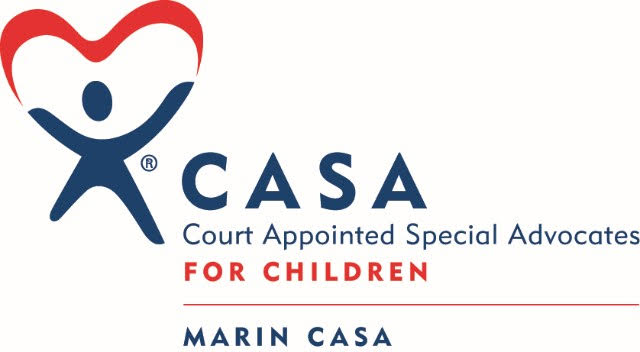MARIN CASA FREQUENTLY ASKED QUESTIONS
Who can I contact to become a Marin CASA volunteer?
Marin CASA Program
E-mail : [email protected]
Phone: 415-785-3862
1401 Los Gamos, Suite #130 San Rafael, CA 94903
What is a CASA volunteer?
A Court Appointed Special Advocate is a trained and supported volunteer who provides one-on-one advocacy to support the best interest of a child in the juvenile court system. CASA serves children who are in the child welfare and juvenile justice systems.
Can anyone volunteer as a CASA?
CASA volunteers are ordinary citizens (who do extraordinary work). No special or legal background is required. Volunteers must pass an extensive background check and volunteers are screened closely for objectivity, competence and commitment.
Do I have to pay to become a CASA?
No, volunteers pay nothing to become a CASA. They do, however, donate their time. Volunteers must participate in a 36-hour training, commit to 2 years to the program and work on their case(s) on average of10-20 hours/month.
Is there a ‘typical’ CASA volunteer?
CASA volunteers are men and women who come from all backgrounds, with a variety of professional, educational, ethnic and socioeconomic backgrounds. CASAs work full-time, part-time, are retired and are students. In order to apply, you must be 21 years or older and you must be able to pass an extensive background screen.
What is the CASA volunteer’s role?
A CASA volunteer provides a judge with a carefully researched background of the child to help the court make a decision about that child’s future. Each case is as unique as the child involved. The CASA volunteer makes recommendations to the judge through court reports, and follows through on the case until it is permanently resolved.
How does a CASA volunteer investigate a case?
In order to make a recommendation to the court, the CASA volunteer must independently investigate a case. This includes talking with the child, parents, family members, social workers, school officials, health providers and others who are knowledgeable about the child’s history and/or current situation. The CASA volunteer also reviews all records pertaining to the child school, medical and social worker reports; and other relevant documents.
How does a CASA volunteer differ from a social worker/child welfare worker?
Social workers are typically employed by state governments. They sometimes work on as many as 12-15 cases (20-30 children) at a time and are frequently unable to conduct a comprehensive investigation for each child. The CASA is a volunteer with one (sometimes two) cases at a time. The CASA does not replace a social worker on a case; he or she is an independent appointee of the court. The CASA volunteer can thoroughly examine a child’s case, has knowledge of community resources, and can make recommendations to the court independent of state agency restrictions.
How does the role of a CASA volunteer differ from an attorney?
The CASA volunteer provides crucial information that assists attorneys in presenting their cases. The CASA does not provide legal representation in the courtroom. CASAs do not represent a child’s wishes in court. Rather, they speak to the child’s best interests. They submit written reports and make recommendations to the court based on best interest.
What training does a CASA volunteer receive?
CASA volunteers undergo a thorough training program conducted by the Marin CASA program. In this extensive 36-hour pre-service training, volunteers learn about courtroom procedure from professionals in the system ‘ from judges, lawyers, social workers, psychologists and others. CASA volunteers also learn effective advocacy techniques for children, and are educated about specific topics ranging from seminars on reporting child abuse and neglect, attachment theory and childhood development, report writing and more. All of our CASA volunteers are supported by their CASA case supervisor who will provide supervision throughout the entirety of the case.
How does the CASA volunteer relate to the child he or she represents?
CASA volunteers offer children consistency as well as a voice during complex legal proceedings. They may explain to the child the events that are happening, the reasons they all are in court, and the roles the judge, lawyers, and social workers play. Sometimes a child just needs a stable and caring adult to listen to their fears, concerns or aspirations and wishes. CASA volunteers encourage their child to express his or her opinions and hopes. By remaining objective observers, CASA volunteers allow children to trust that, in a time of trouble, there are adults who will come forward and will help.
How many cases on the average does a CASA volunteer carry at a time?
Typically, CASA volunteers are assigned to one (sometimes two) cases at a time.
Do lawyers, judges and social caseworkers support CASA?
Yes! Juvenile and family court judges implement the CASA program in their courtrooms and appoint the volunteers. CASA has been endorsed by the American Bar Association, the National Council of Juvenile and Family Court Judges, and the National Association of the Public Child Welfare Administrators.
Does the federal government support CASA?
CASA is a priority project of the Department of Justice’s Office of Juvenile Justice and Delinquency Prevention. The office encourages the establishment of new CASA programs, assists established ones, and provides partial funding for the National CASA Association.
How many CASA programs are there?
As of last year, there were close to 1,000 CASA programs in 49 states including the District of Columbia. New programs start up at the average rate of four per month!
How effective have CASA programs been?
Research shows that children who have been assigned CASA volunteers tend to spend less time in court and less time within the foster care system than those who do not have CASA representation. Judges have observed that CASA children also have better chances of finding permanent homes than non-CASA children and have significantly better outcomes in school.
How much time does it require?
Each case is different. A CASA volunteer typically spends about 10 hours doing research and conducting interviews at the start of a case. Throughout the proceedings, volunteers work about 10-20 hours a month, per case.
How long does a CASA volunteer remain involved with a case?
A volunteer remains on the case until it is permanently resolved. One of the primary benefits of the CASA program is that, unlike other professionals who often rotate cases, the CASA is a consistent figure in the proceedings, and provides continuity for the child. This is why the 2 year commitment is so critical to the program.
Are there any other agencies or groups that provide the same service?
No. There are other child advocacy organizations, but CASA is the only program where volunteers are appointed by the court to represent a child’s best interest. In some jurisdictions, CASAs are known as Guardians ad Litem (GAL).
What children are assigned CASA volunteers?
Children who are victims of abuse and neglect who have become dependents of the court are assigned CASA volunteers. The program is most common in juvenile court cases (300 Dependency and 600 Delinquency) and probate cases.
How is CASA funded?
At the local level, CASA programs are funded in a variety of ways, ranging from the state’s Department of Justice to traditional 501(c)3 funding streams which rely on individuals and grants.

